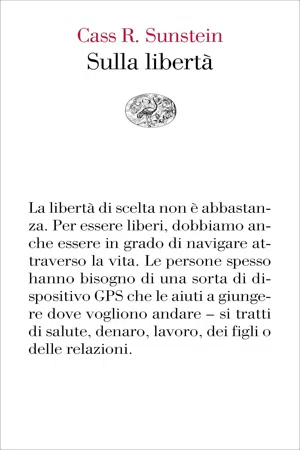Introduzione. Mordere la mela.
1. Vedi SHAHRAM HESHMAT, Addiction. A Behavioral Economic Perspective, Routledge, New York 2015; NICK HEATHER e GABRIEL SEGAL (a cura di), Addiction and Choice. Rethinking the Relationship, Oxford University Press, New York 2017.
2. Genesi 3, 6-7. Una trattazione eccellente si trova in STEPHEN GREENBLATT, Ascesa e caduta di Adamo ed Eva, Rizzoli, Milano 2017 [ed. or. The Rise and Fall of Adam and Eve, W. W. Norton, New York 2017].
3. ANTONIA S. BYATT, Possessione, trad. it. di Anna Nadotti e Fausto Galuzzi, Einaudi, Torino 1992, p. 505 [ed. or. Possession, Vintage, New York 1990].
4. JOHN STUART MILL, Sulla libertà, trad. it. di Giovanni Mollica, Bompiani, Milano 2000 [ed. or. On Liberty, Longmans, Green, Reader & Dyer, London 1859]. Una disamina recente e accurata si trova in B. DOUGLAS BERNHEIM, The Good, the Bad, and the Ugly. A unified approach to behavioral welfare economics, in «Journal of Benefit-Cost Analysis», VII (2016), n. 1, pp. 12-68. Nella tradizione filosofica liberale includo un vasto numero di pensatori politici, anche conservatori. Una critica di Mill, rappresentativa di un pensiero conservatore di stampo diverso, si trova in JAMES FITZJAMES STEPHEN, Liberty, Equality, Fraternity, Smith, Elder & Co., London 1874; Liberty Fund, Ann Arbor (Mich.) 1993. Dovrebbe essere chiaro che, ponendo al centro la navigabilità, tralascio alcune questioni concettuali relative alla definizione di libertà e prendo le mosse da idee che sono (spero) ampiamente condivise.
5. RICHARD H. THALER e CASS R. SUNSTEIN, Nudge. La spinta gentile. La nuova strategia per migliorare le nostre decisioni su denaro, salute, felicità, Feltrinelli, Milano 2009, p. 12 [ed. or. Nudge. Improving Decisions About Health, Wealth, and Happiness, Penguin, New York 2009]. Una discussione istruttiva, che vale senz’altro la pena di leggere con attenzione, per quanto non la condivida appieno, si trova in B. DOUGLAS BERNHEIM e DMITRY TAUBINSKY, Behavioral public economics, NBER Working Paper n. 24828, National Bureau of Economic Research, Cambridge (Mass.), lu-glio 2018, consultabile all’indirizzo: http://www.nber.org/papers/w24828/.
6. Alcune obiezioni si trovano in SARAH CONLY, Against Autonomy, Cambridge University Press, New York 2011.
Capitolo primo, Che cavolo è l’acqua?
1. DAVID FOSTER WALLACE, Questa è l’acqua, a cura di Luca Briasco, Einaudi, Torino 2009, p. 143 [ed. or. David Foster Wallace, In his own words, in «The Economist. 1843», all’indirizzo: https://www.1843magazine.com/story/david-foster-wallace-in-his-own-words/].
2. MEGHAN R. BUSSE et al., Projection bias in the car and housing markets, NBER Working Paper n. 18212, National Bureau of Economic Research, Cambridge (Mass.), lu-glio 2012, all’indirizzo: http://www.nber.org/papers/w18212/.
3. Vedi GREGORY J. MARTIN e ALI YURUKOGLU, Bias in cable news. Persuasion and polarization, in «The American Economic Review», CVII (2017), n. 9, pp. 2565-99.
4. Vedi STEVE KRUG, Don’t Make Me Think. Un approccio di buon senso all’usabilità web e mobile, Tecniche Nuove, Milano 2014 [ed. or. Don’t Make Me Think Revisited. A Common Sense Approach to Web and Mobile Usability, New Riders, San Francisco 2014].
5. Vedi MARK WHITEHEAD, RHYS JONES, RACHEL LILLEY, JESSICA PYKETT e RACHEL HOWELL, Neuroliberalism, Routledge, New York 2018; DAVID HALPERN, Inside the Nudge Unit, W. H. Allen, London 2015; CASS R. SUNSTEIN, Semplice. L’arte del governo nel terzo millennio, Feltrinelli, Milano 2014 [ed. or. Simpler. The Future of Government, Simon & Schuster, New York 2013].
6. RAJ CHETTY, JOHN N. FRIEDMAN, SØREN LETH-PETERSEN, TORBEN HEIEN NIELSEN e TORE OLSEN, Active vs passive decisions and crowdout in retirement savings accounts. Evidence from Denmark, in «The Quarterly Journal of Economics», CXXIX (2014), n. 3, pp. 1141-219; RICHARD H. THALER, Much ado about nudging, in «Behavioral Public Policy Blog», 2 giugno 2017, all’indirizzo: https://bppblog.com/2017/06/02/much-ado-about-nudging/.
7. SUMIT AGARWAL, SOUPHALA CHOMSISENGPHET, NEALE MAHONEY e JOHANNES STROEBEL, Regulating consumer financial products. Evidence from credit cards, in «The Quarterly Journal of Economics», CXXX (2015), n. 1, p. 111.
8. FRIEDRICH HAYEK, La via della schiavitú, trad. it. di Dario Antiseri e Raffaele De Mucci, Rusconi, Milano 1995, p. 87 [ed. or. The Road to Serfdom, Routledge Press, London 1944].
9. Vedi SCHLOMO BENARTZI et al., Should governments invest more in nudging?, in «Psychological Science», XXVIII (2017), n. 8, pp. 1041-55.
10. THALER e SUNSTEIN, Nudge cit., p. 11 (in corsivo nell’originale).
11. MILL, Sulla libertà cit., p. 239. Per un’utile discussione, vedi BERNHEIM, The Good, the Bad, and the Ugly cit.
12. FRIEDRICH HAYEK, The Collected Works of F. A. Hayek, vol. XV, The Market and Other Orders, a cura di Bruce Caldwell, University of Chicago Press, Chicago 2014, p. 384. Per alcune domande su questa affermazione e anche su quella di Mill, vedi CONLY, Against Autonomy cit.; CASS R. SUNSTEIN, Effetto nudge. La politica del paternalismo libertario, Università Bocconi Editore, Milano 2015 [ed. or. Why Nudge?, Yale University Press, New Haven (Conn.) 2015]. Qui sorvolo su quelle domande.
13. Per una discussione sul tema, vedi CASS R. SUNSTEIN, The Ethics of Influence, Cambridge University Press, New York 2016; GEORGE A. AKERLOF e ROBERT J. SHILLER, Ci prendono per fessi. L’economia della man...
